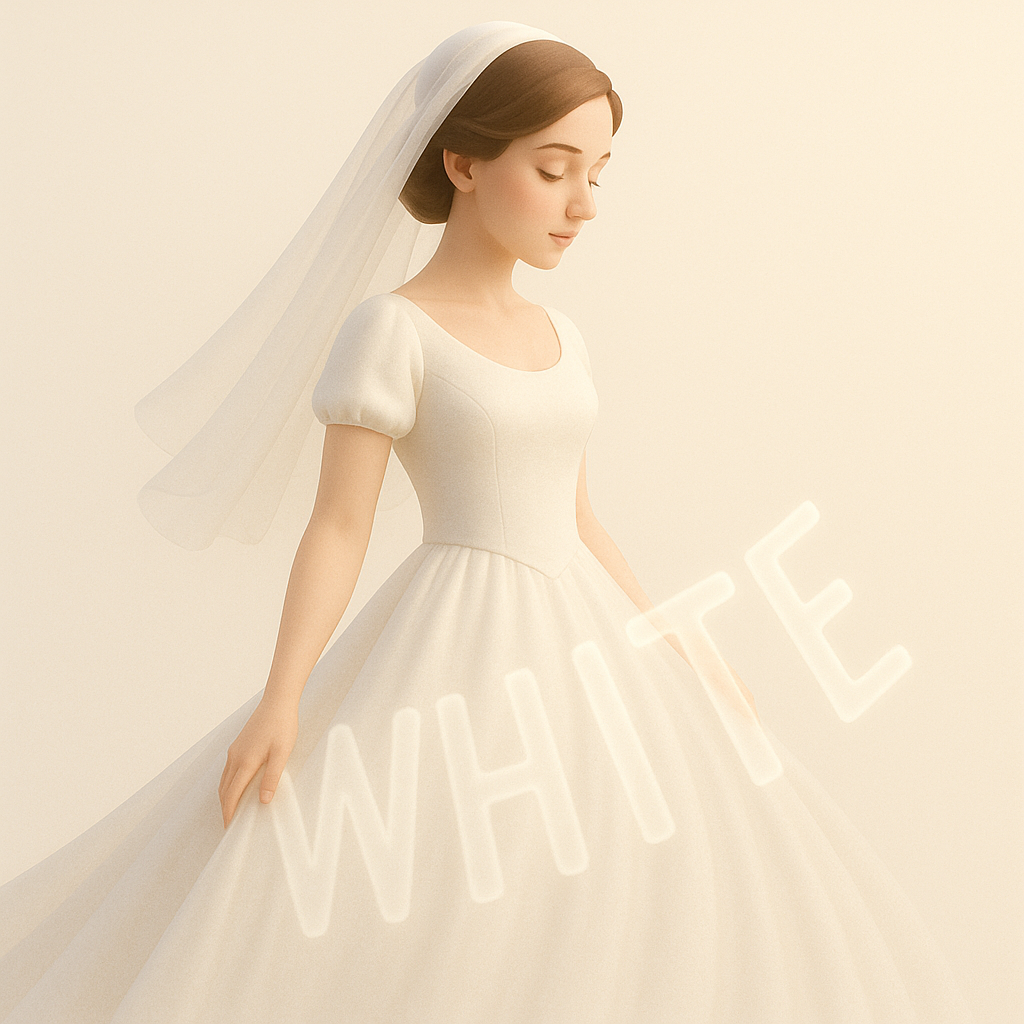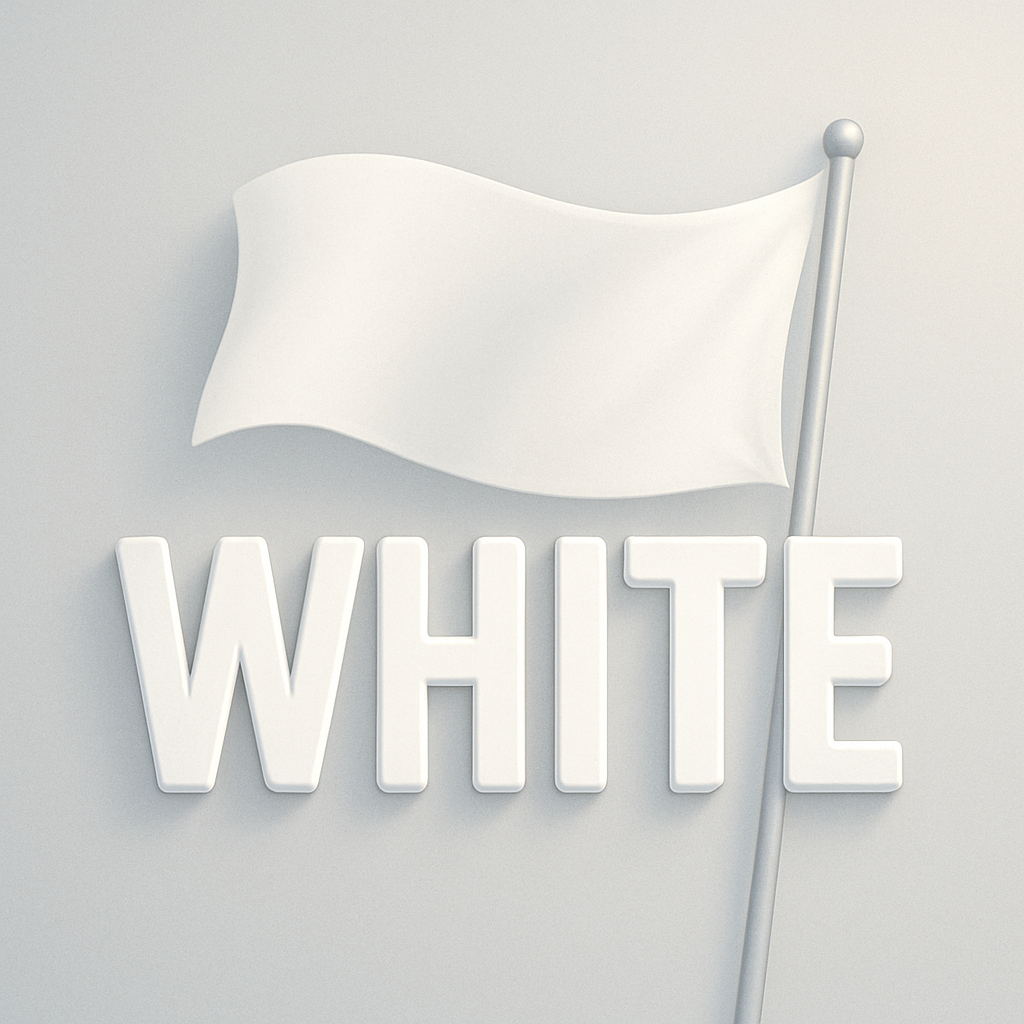White
Definition
White refers to the color of pure snow or milk, perceived as the absence of color or the combination of all visible light wavelengths. It can also describe something pale, uncolored, or free of blemish, as well as symbolize purity or cleanliness.
Parts of Speech
- Adjective
- Noun
Pronunciation
American English
- IPA Pronunciation: /waɪt/
- Respelling: WYTE
British English
- IPA Pronunciation: /waɪt/
- Respelling: WYTE
Etymology
The word "white" originates from Old English "hwit," derived from Proto-Germanic "hwītaz" and Proto-Indo-European "kʷeid," meaning "to shine." It has long been associated with light, purity, and brightness in various cultures.
Derivatives
- Whiteness (noun)
- Whitening (noun/verb)
- Whitewash (verb/noun)
- Whiteout (noun)
- Whiteboard (noun)
Synonyms
- Pale
- Light
- Snowy
Antonyms
- Black
- Dark
- Colored
Usage
The adjective "white" is used to describe objects or appearances with a light or pale color, as in "The white dress looked elegant." As a noun, it can refer to the color itself or objects that are white, such as "The walls were painted in white."
Related Terms
- Brightness: The quality of being light or radiant.
- Purity: The state of being free from blemish or contamination.
- Neutral: A color that is not strongly colored, such as white or gray.
Detailed Definitions
Adjective
- Of the color white: Describes something that appears as pure snow or milk.
- Example: "The bride wore a white gown."
- Pale or lacking color: Refers to objects or appearances that are light or uncolored.
- Example: "His face turned white with shock."
- Symbolizing purity or cleanliness: Indicates moral or physical cleanliness.
- Example: "The white flag is a symbol of surrender."
Noun
- The color white: Refers to the color produced by all wavelengths of visible light combined.
- Example: "The room was painted in bright white."
- Something that is white in color: Describes objects or substances with a white appearance.
- Example: "The white of the egg is rich in protein."
white



🇨🇳 Mandarin (Simplified Chinese)
- 白色 (White color)
- IPA: /paɪ⁴⁵ ʂɤ³⁵/
- English Respell: Báisè
🇮🇳 Hindi
- सफेद (White)
- IPA: /səpʰeːd̪/
- English Respell: Safed
🇪🇸 Spanish
- Blanco (White)
- IPA: /ˈblanko/
- English Respell: Blanco
🇫🇷 French
- Blanc (White)
- IPA: /blɑ̃/
- English Respell: Blanc
🇸🇦 Modern Standard Arabic
- أبيض (White)
- IPA: /ʔaˈbijdˤ/
- English Respell: 'Abyad
🇧🇩 Bengali
- সাদা (White)
- IPA: /ʃada/
- English Respell: Shada
🇷🇺 Russian
- Белый (White)
- IPA: /ˈbʲelɨj/
- English Respell: Belyj
🇵🇹 Portuguese
- Branco (White)
- IPA: /ˈbɾɐ̃ku/
- English Respell: Branco
🇮🇩 Indonesian
- Putih (White)
- IPA: /pu.tih/
- English Respell: Putih
🇩🇪 German
- Weiß (White)
- IPA: /vaɪs/
- English Respell: Weiß
🇯🇵 Japanese
- 白 (White)
- IPA: /ʃiɾo/
- English Respell: Shiro
🇻🇳 Vietnamese
- Trắng (White)
- IPA: /ʈaːŋ˧ˀ˨ʔ/
- English Respell: Trắng
🇰🇷 Korean
- 하얀색 (White color)
- IPA: /ha.jan.sʰɛk̚/
- English Respell: Hayansaek
🇹🇷 Turkish
- Beyaz (White)
- IPA: /be.jaz/
- English Respell: Beyaz
🇵🇰 Urdu
- سفید (White)
- IPA: /sʊ.fiːd̪/
- English Respell: Sufeed





